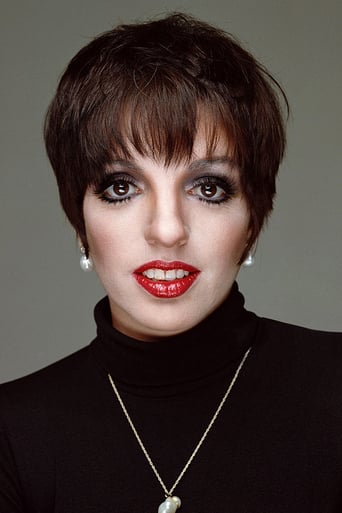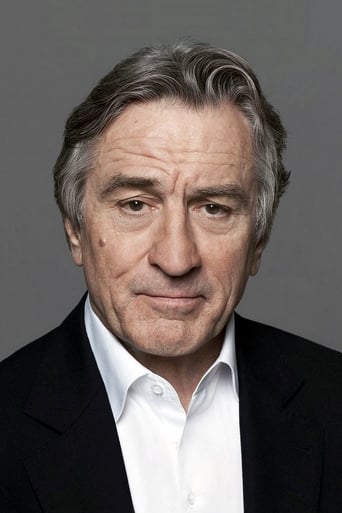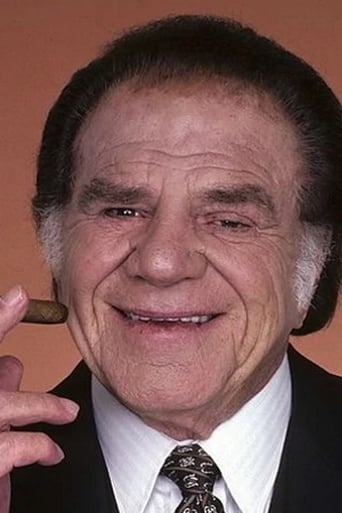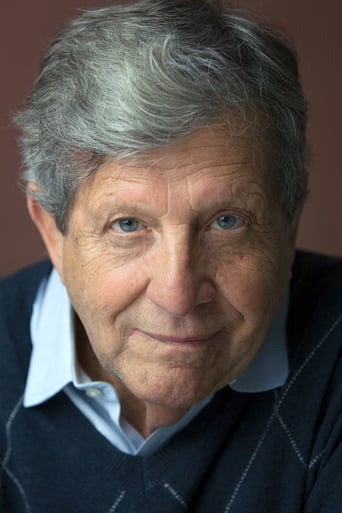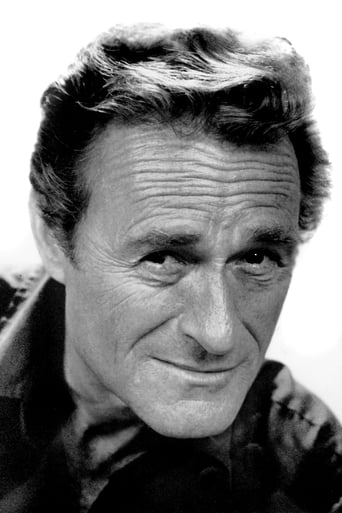Karry
Best movie of this year hands down!
Stometer
Save your money for something good and enjoyable
PodBill
Just what I expected
Maleeha Vincent
It's funny, it's tense, it features two great performances from two actors and the director expertly creates a web of odd tension where you actually don't know what is happening for the majority of the run time.
xtian_durden
Coming from the success of his previous films, Scorsese went back to the 40s and made a tribute to his home town and the classic Hollywood genre – although he refused to call it a musical, mentioning Billy Wilder's statement that you can't call a film a musical unless characters sing in situations where you don't expect them to.With almost a three-hour running time, this highly stylized film filled with music and a rambling plot was a box-office failure and only a few critics giving a positive review, including Roger Ebert who said that if we forgive the movie its confusions we're left with a good time. Robert De Niro, collaborating for the third time with Scorsese for his least memorable character with the director, was not charming in this film and almost coming off as an annoying selfish character (and maybe that's the point), but Liza Minelli was great when performing the songs, especially in the highest point of the film when she sang its theme song, which is more memorable than the film itself – an indication that it was one of Scorsese's rare miscarriage as a director.The failure of the film led his cocaine addiction into rock bottom, which obviously he will recover from with flying colors – bouncing back in the next decade for a brand new chapter of his life and career.
Andrew Boone
The first thing that needs to be said about Scorsese's highly underrated "New York, New York" is that it can't possibly be fully appreciated by anyone who hasn't seen films like "An American in Paris" and "Singin' in the Rain". Scorsese's film is very much a pastiche (or parody, depending on your perspective) of these earlier musicals by MGM. The entire formula for the film is based around them. Stylistically attractive visuals, light and witty dialogue, a romance at the center of the story, and a foray into narratively digressive musical territory toward the end of the film. It's all there. This hypotextual reflection of Hollywood's golden age, however, is only half the picture. The other half is that this is very much a Scorsese film, despite many claims to the contrary. Scorsese's hallmarks are all over it. We have Robert De Niro in the lead role, playing an oppressive, dominant alpha male personality type, amplified by a bit of that good old-fashioned Italian-American upbringing that Scorsese knew so well. Harvey Keitel played this character in "Who's That Knocking at My Door" and "Mean Streets" (and even "Alice Doesn't Live Here Anymore", in a lesser role), and now, for "Taxi Driver", "New York, New York", "Raging Bull", and even "Casino", it's De Niro. I've seen nineteen Scorsese films, and this is by far the most cinematographically impressive of them all. The lighting is flawless; the direction exemplary. Scorsese has always been a top talent in terms of his technical skills as a director, but visually, this film is stunning on an entirely different level. The film's aesthetic seeks to mimic the visual attractiveness of those classic Hollywood musicals (Scorsese even gives us a few false backgrounds, just for good measure), and in that way it was very successful. This film is eye candy on a par with Wong Kar-wai's "In the Mood for Love", Korine's "Spring Breakers", Refn's "Only God Forgives", or Fassbinder's "Lola". As for the film's content, about which too little has been written, the entire thematic core of the film is reflected in the casting of its two principal parts: First, we have Robert De Niro, the classic Scorsese casting choice, playing very much the same character we've seen him play in other Scorsese films. On the other end, we have Liza Minnelli, the daughter of none other than Judy Garland, the ultra-famous musical actress of Hollywood's glory days. And Liza's father? Vincente Minelli, director of famous Hollywood musicals like "The Band Wagon", "Gigi", and "An American in Paris". Scorsese throws these two characters together in a violent tempest of passion and suffocating possessiveness. But we, the audience, are also witnessing two worlds being thrown together: De Niro represents Scorsese's world — his vision of a reality steeped in alpha male aggression and hyper-possessiveness over females — and Liza Minnelli, daughter of the golden age of Hollywood, represents that other, make-believe world of American culture — that unique brand of lighthearted escapism and pure cinematic fantasy that Hollywood produced so enticingly in the '30s, '40s, and '50s. Cinematically, we are watching traditional Hollywood fantasy pitted against a vaguely Cassavetes-esque realism.What will happen when these two disparate realities attempt to coexist? Well, Scorsese doesn't offer an outright answer, except to say it will be difficult — extremely difficult. Hollywood fantasy has created in the American mentality a world of misplaced priorities and unrealistic expectations regarding life. When the film begins, Minnelli's character seems to have her life together in a way that few Scorsese characters do (naturally, since she's not from Scorsese's world — she is born of that distant land called Hollywood). And then De Niro enters her life, from the other end of the spectrum, and emotionally shatters her to pieces. And so it's very much a film about the conflict between reality and fantasy. Ultimately, reality obliterates fantasy. The musical detour (the film-within-the-film at the end of the movie) has been the source of a lot of criticism, but once again, no one who's seen "An American in Paris" or "Singin' in the Rain" would be surprised by it. It was a structural necessity if the film was going to accurately echo the formula of those older films, as it clearly intended to do. That being said, I will admit that, at 160+ minutes in length, to abandon over two hours of plot and move into a musical digression so late in the film certainly tests the viewer's patience. There is a moment in this segment, however, that makes it all worthwhile. In this moment, we see movie theater viewers sitting in their seats watching a film, looking straight at us (the camera is placed behind what would be the screen of their theater), and behind them is the projector, casting its image directly at us. And so just as we are sitting in our theater watching them stare at the screen (at us), they are, perhaps, sitting in their theater watching us stare at our screen. And so Scorsese subtly implicates us into the film's themes of fantasy versus reality. Their reality has become our fantasy, and, possibly, our reality has become their fantasy. The final shot of the film is a reference to Gene Kelly's most memorable moment from "Singin' in the Rain". De Niro is in the street. He stands still, propping himself up with an umbrella. The camera pans down to his feet, pausing on them for a moment. The credits roll. We are left to savor the bitter and disenchanting taste of a reality so contrary to the one that Hollywood has offered us. De Niro was standing on a road that could have very well been the same one on which Gene Kelly sung in the rain with his umbrella. But there is no singing here, the umbrella is closed, and those feet aren't dancing. Reality has decimated the Hollywood fantasy.RATING: 8.00 out of 10 stars
rooprect
"New York, New York" is a musical brought to us by the director (and leading actor) of "Taxi Driver" just a matter of months after that hard-hitting, violent classic shocked us. What Scorsese sought to do here was use the style of those candy-coated technicolor song & dance films our grandparents grew up on ("Singin in the Rain" and such) but give it a more realistic edge. Visually he succeeded impressively. The sets, lighting, camera work and costumes are exactly as you'd expect from a classic toe tapper. As for the realistic edge, he also succeeded--perhaps too well.Like a few other reviewers, I have a problem with the casting of Di Nero, especially when contrasted against the sweet, passive charm of Liza Minnelli (whose amazing performance I'll get to later). From the outset, Di Nero comes across as a borderline psycho just waiting to smack a few women around, and I found that to be very distracting from an otherwise personal story.In Scorsese's prologue to the 35th Anniversary DVD he talks about how he wanted to tell a story of 2 people in love who just can't seem to mesh due to personality & artistic differences. But instead what we get is the story of an abusive man and a submissive woman. This is not, as Scorsese implies, simply a personality difference. It's a very polarized tale of a creep & a sweet girl. Honestly, it was Scorsese's deceptive prologue that made me feel like the film failed. If he hadn't said anything, or if he had more accurately said that this is a disturbing story of domination set as a cute musical, I would have said it was a triumph. But in that it fails to do what the director says it's designed to do, it fails artistically.Does that mean it's a bad movie? Absolutely not! Just like "Rollerball" (1976) was supposed to be Norm Jewison's anti-violence film but ended up thrilling us with its heart-pounding action & violence, "New York, New York" is a very well made, entertaining and masterful piece of film. The contrast between its charming visuals and its unsettling dysfunctional love story is very effective. I just wish it had featured a different leading male--someone better suited to play an imposing figure with a heart (Christopher Walken, anyone?) rather than Di Nero who, at least in this film, comes across as a villain.Liza Minnelli is stunningly good. She is what raises this film from "good" to "great". Her character is submissive to Di Nero's tyrannical presence; yet we never get the feeling that she's a pitiable victim. Instead, she seems smart, bold, and while she doesn't fight back at times we wish she would, she always deals with the problem instead of lying down and taking it. Her emotional scenes are very genuine (not sappy). And of course that voice! This is one of the rare musicals where a song number *adds* to the drama rather than serving as a sideshow.In all, this is a unique and powerful film which you should watch if you get the opportunity (note: although it's quite long, be sure to see the uncut 2 1/2 hour version). While it seems to have failed at delivering the director's original intent, it does give us something else worth sinking our teeth into.
Terrell Howell (KnightsofNi11)
Ah the infamous directorial dud. I can't seem to escape you lately. And this time you appear with one of the greatest directors of all time, Martin Scorsese. But I suppose it would make sense that you would appear in the form of a three hour musical romance. New York, New York chronicles the story of two lovers, Jimmy Doyle, a talented saxophone player, and Francine Evans, a very talented singer. The two meet on V-J day and continuously fall in and out of love as they try to elevate their careers to grand heights while trying to cope with the other. It is a story of two people so wildly talented that they almost cancel each other out and cannot contend with each other because of their own immense talent. The film is an epic love saga that I don't really think needed to be that at all.What I can say about this film, and what I will always say about a Scorsese film whether I like it or not, is that the visuals are great. The settings are immaculate and beautiful and all aspects of the production fit a thriving and grandiose time period excellently. The scenes are eloquent, the costumes dazzling, the overall atmosphere is vivacious and carefree. Plus, Scorsese directs with elegant precision, capturing a lively and spirited mood throughout the film. His huge dedication to filmmaking is very evident through the style which he imprinted this film with. Few directors can capture a time period in both a physical and mental aspect but Scorsese is one of them. There is a real hint of nostalgia in this film as we return to the glorious and romantic time of post-war America.These visuals can only keep one intrigued for so long, however. And that amount of time means nothing when your film is close to three hours long. There are certain films that demand three hour runtimes because of their depth and complexity. New York, New York is not one of those films. Too many scenes in this film just seem to be there to pad the film, making it longer so as to achieve the status of romantic epic. The film is bubbling over with scenes that could have been cut or shortened significantly and the film could have played out just the same. And so as the film neared the two hour mark I became terribly bored. The film opens with a bang that is a glorious explosion on the eyes and ears but its all downhill from there. The film gets slower and slower and drags more and more thing out way longer than they need to be. I'll admit that the ending is good and closes the painfully long story as best it could, but its an ending that shouldn't have taken three hours to arrive at.I wanted to like New York, New York because I adore Scorsese. However, I couldn't bring myself to fully enjoy this film simply because it is just too long and not interesting or deep enough to warrant this kind of runtime. Scorsese certainly created a visual spectacle, but that spectacle really starts to lose its shine about two hours into the film when you know you have almost an hour left. I can't say I hated this film because it tries to be very good and succeeds in some areas, but overall it misses the mark and falls short of being great.



